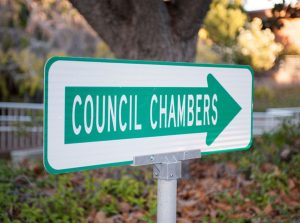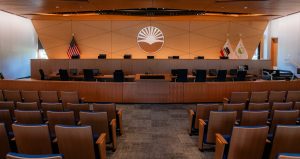As one of its last acts of 2015 the Santa Clara Unified School Board voted 5-1 to try to extend 2012’s $84 parcel tax, starting by conducting a voter poll in January – the second in two years. Trustee Andy Ratermann cast the sole dissenting vote. Trustee Michele Ryan was absent.
The 2012 tax “was passed during a period of economic uncertainty [and]…is due to sunset in June 2017.” The board wanted “to discuss whether or not the district should consider seeking or some equivalent measure to begin when current one sunsets,” according to the agenda.
In 2012, SCUSD had lost $34 million, and faced another $5 million in cuts in 2012. In view of that financial crisis, the parcel tax was intended “to maintain the quality of our local core academic programs in math and science, keep libraries open, attract and retain the best qualified teachers and staff, and to provide up-to-date textbooks and classroom technology,” according to the district website.
Now the district’s revenue has grown to $184 million from $114 million in 2012, and is projected to be $210 million in 2020. However, the majority of trustees said the parcel tax should be continued to have it in place during the next economic decline, when people not be inclined to add to their tax burdens.
“Because the economy is so good, people will want to support education,” said Trustee Noelani Sallings at the Dec.10 meeting.
Voter support requires voter trust, Ratermann said. “When we were looking at doing the parcel tax, we told the voters that this would not be a permanent thing. “So to me it’s an integrity issue. I don’t think it’s the right thing to do ethically. I don’t want to see us spend money on polling.” The cost of the poll was under $50,000, and thus didn’t have to appear on an agenda for board approval.
“I don’t think there’s something fundamentally immoral in asking our constituents to invest in our schools,” said Trustee Chris Stampolis. “The question is, what will we do with the money? If anything, we should have more buy-in from the community. I’d like to see us go forward with a discussion of what we’d do with this money.”
When the economy drops is not the time to ask for money, said Trustee Jodi Muirhead. Given the highs and lows of the Silicon Valley economy, it would be prudent to extend the parcel tax in anticipation of the next economic “storm.”
“I’m not opposed to polling,” said Trustee Jim Canova. “I believe to not take that temperature and then wait for the future when the bottom falls out again” would be a mistake. The board might regret not taking advantage of the present boom. “If there is support, that’s information that we probably need to think about.” State law limits school district reserves, so it’s unclear how much the additional revenue could be set aside.
“When you do a poll, the questions go to what you’re going to use the money for,” Ratermann responded. “I think we need to keep our promises. When we do need money we don’t want people to say that we didn’t keep our word. I also think the poll is a waste of money. I don’t think it’s going to be positive.”
“I don’t think we’re talking about a lot of money [for the poll],” Stampolis said. “I think it would be the responsible thing to do.”
One constituency, however, supported Ratermann’s view – district staff and teachers, who provided much of the organization and “boots on the ground” for previous bond and parcel tax measures.
“The CSEA will not support a parcel tax, nor will we support a costly demographic study,” said California State Employees Association unit president Patty Picard. “We told the community that we would not be coming back for more. We need to keep our promise.”
Picard reiterated her sentiment at the first board meeting of the New Year, even though the parcel tax wasn’t on the agenda. “We do parcel taxes when there’s a need. Not just because there’s money out there. I would have a hard time supporting a parcel tax when we’re doing well. Just because one parcel tax runs out doesn’t mean you need another one.”
The district’s financial picture has changed in fundamental ways since the 2012 parcel tax was passed. In the last year, SCUSD’s assessed property value – its main source of revenue – grew almost 8 percent to $41.3 billion – delivering $410 million in property tax, of which 40 percent goes to SCUSD. New construction in 2014 added $153 million to the property tax roll, so the growth isn’t just price inflation.
Levi’s Stadium alone added $1.4 billion in value and $5.6 million in tax revenue – $2.2 million of which goes to SCUSD.
The RDA dissolution brings another $3.5 million annually to the district. In addition, as a result of Santa Clara’s RDA settlement with the county, $300 million (2012 dollars) worth of City real estate will be sold and 40 percent of the proceeds will go to SCUSD. There’s also about 35 million square feet of planned construction, which will deliver some $118 million in development fees over the next five years.
Parcel Taxes: Another Symptom of California’s Tax Schizophrenia.
Since passing 1979’s Prop 13 capping property taxes, California voters have continuously teased out detours around the law they themselves passed – at the same time resisting all efforts to openly change Prop 13.
Parcel taxes are “special taxes” not included in Prop 13’s limitations. They are flat taxes levied on property parcels regardless of property value. The owner of an 800-unit apartment complex pays the same amount as someone living in an 800-square foot condominium. Exemptions are almost always given to people over 62 or 65.
A two-thirds vote is required to pass parcel taxes, but beyond that there are virtually no rules.
Any public agency can levy parcel taxes, and there are no standards for balloting, administration, sunset dates, caps or oversight, and can be used for anything, unlike bond proceeds. Parcel taxes don’t show up on a regular tax bill and aren’t considered part of a school district’s property tax revenue.
There are no uniform reporting requirements – the Santa Clara County Assessor doesn’t include parcel taxes in its annual tax rate schedule. Unlike Mello Roos parcel taxes, which only property owners can approve, everyone gets to vote on parcel taxes – but only property owners pay them.
Parcel taxes are prevalent in affluent school districts and rare in poor ones, according to a 2013 study by the Public Policy Institute of California (PPIC), “Parcel Taxes for Education In California.”
The researchers found that 44 percent of school districts with median household incomes in the top 10 percent had passed parcel taxes, while only 7 percent of districts with median household incomes in the bottom 90 percent had done so. Most districts with parcel taxes are Basic Aid – property tax revenue per student exceeds state entitlements – and in the Bay Area.
Parcel taxes also tend to become habits, the PPIC found. Eighty-seven percent of school districts that proposed parcel tax measures between 2007 and 2011 had previously passed parcel taxes within the last 10 to 12 years. Researchers didn’t find similar patterns for bond issues – the other significant source of additional school funding.
One example is Los Altos school district, which originally passed a parcel tax in 1989 for $168 per parcel. This was renewed in 1997 and raised to $264, in 2002 to $597, and in 2006 at the same amount. In 2011 Los Altos voters approved a second $193 parcel tax expiring in 2017.
The PPIC also suggest a “keeping up with the Joneses” influence at work. When the Campbell Union elementary school district had a parcel tax election last year, one of the arguments was that the district had never asked for a parcel tax.
In addition to the parcel tax, SCUSD taxpayers pay four general obligation bond tax levies, adding $94.20 to each $100,000 of assessed property value. Santa Clara residents in the Campbell and Cupertino school districts are paying off five bond measures, which add $81 and $90, respectively. These are in addition to county retirement, water district, and three community college bond levies.
Just don’t call them property taxes.











0 comments